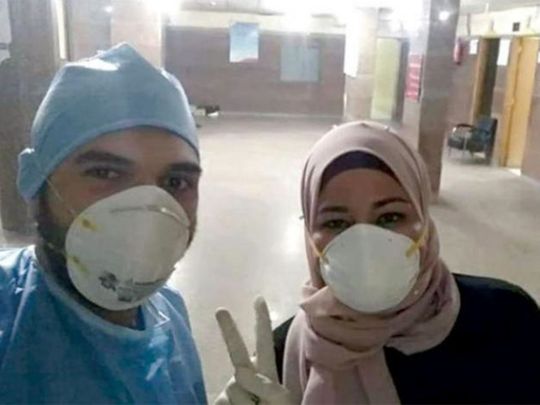
Abu Dhabi: No one is immune from bad news or disappointment in life. So, when an Egyptian nurse did get the shocking diagnosis of COVID-19 infection, she encountered it head-on and moved on with her life unscathed.
Efrag Fat’hi Bakri, 32, responded to her shocking news from a doctor by confronting the negative emotion bravely and having a selfie with the doctor, who informed her of the most terrifying news, making the situation less traumatic.
Efrag works at Al Sadr Hospital in Beni Suef Governorate, 130km south of Cairo, and is currently staying home, where she applies the second phase of the isolation. She tells Asharq Al Awsat newspaper how she rebelled against her family’s concerns about working in the isolation hospital, and even contracting the coronavirus, which she steadfastly accepted and was sure to overcome.
Initially, she was working in the hospital’s intensive care ward, away from the coronavirus isolation cases.
“As she first confirmed COVID-19 case was admitted to the hospital, I noticed some nurses were afraid to deal with it,” She says.
“It was difficult for us at the beginning of the crisis, with a lack of capabilities and a state of anxiety ... I could have continued my work away from Coronavirus cases, but I decided to volunteer, out of a humanitarian motivation, join the isolation staff, and contribute even a little to preventing the spread of the pandemic,” Efrag says.
Efrag made an irreversible decision, and demanded that the hospital administration provide a place for her house, giving up her private work in a medical center, for fear of transmitting the infection, equipped with a decisive response to an expected opposition from the family that it was a “mandatory assignment” from the Ministry of Health that could not be refused or she would have lost her job.
She says, “As soon as I informed the family, everyone refused for fear for my health and my three children’s .. but I did not leave them any option, and was absolutely indifferent to their warnings.”
Efrag refers to four of her colleagues who followed her example, and insists on mentioning their names: Mahjoub Shaban, Marwa Hussein, Tahani Yassin, Najwa Khallaf, and the latter two were infected with the virus as well.
The duration of the scheduled mission was 14 days. On the penultimate day, I felt tired when climbing up the stairs of the hospital, the supervising doctor noticed that, so he decided that everyone undergoes COVID-19 test.
The symptoms gradually started to appear ... shortness of breath followed by sore throat and fatigue,” but without a rise in temperature, explains Efrag. And before the results of the test appeared, she was more than 70 per cent sure that she contracted the strain, and that she was on her way to quarantine, so she started packing her bag.
Efrag was informed of her infection by the hospital director who tried to be sympathetic and reframe the situation to avoided her shock, but she received the bad news and found healthy ways to vent her emotions, , as she asked him for a “selfie” before the quarantine.
In Egypt, there are more than 100 Covid-19 infections among medical staff, including 10 deaths, according to official statistics.
Efrag believes that the virus can be contracted anywhere, and it is not linked her work. “Fate is inevitable,” She adds.
When she was transferred to isolation, the paramedic looked at her with admiration, saying that she was the first female COVID-19 patient he has seen being treated without panic.
Efrag is living in the village of “Ihou”, located in Beni Suef. Her husband and children (a daughter and two sons, the elder in the preparatory school) learned of the news of her infection on the second day, after the preventive medical staff went to sterilise the house, and they collapsed, considering that the matter was irrevocable separation from their mum, especially since Efrag’s father passed away only two months ago, so she started reassuring them instead of receiving their assurances.
Efrag was transferred to isolation hospital in the city of Mallawi, Minya, 10,655km south of Cairo, mid-April. On that, she says: “I was looking at it as an opportunity to reflect and prioritise, so I read books and novels on the Internet.”
With 17 years of experience in nursing, she has gone through the most difficult times, and the pain of illness that “intensifies with the taking of immune-enhancing drugs.”
Efrag did not regret a moment’s of her work at the isolation hospital, saying, “I thought death in these circumstances was the best end I wish for.” She spent 16 days in the quarantine. After two positive tests, the third came negative, and Efrag survived and saw her children after about 40 days of work and treatment.
Only when she spoke about the harassment of “social stigma” to which she was subjected, despite her excuse for all, did she give up her optimism. She says, “On my way home after I was discharged from the hospital, the taxi driver learned while I was on the phone that I was suffering from COVID-19, so he only had to stop the car,” asking her to get out on the pretext that he had an important journey.
Also, when Efrag wanted to shop at the supermarket, the shop assistant, who knew her, refused to deal with her.
Efrag, still on convalescence leave, is currently suffering from complications in the chest, despite her full recovery from the virus, but she wishes to return to work in the isolation hospital again after the doctors’ approval.












